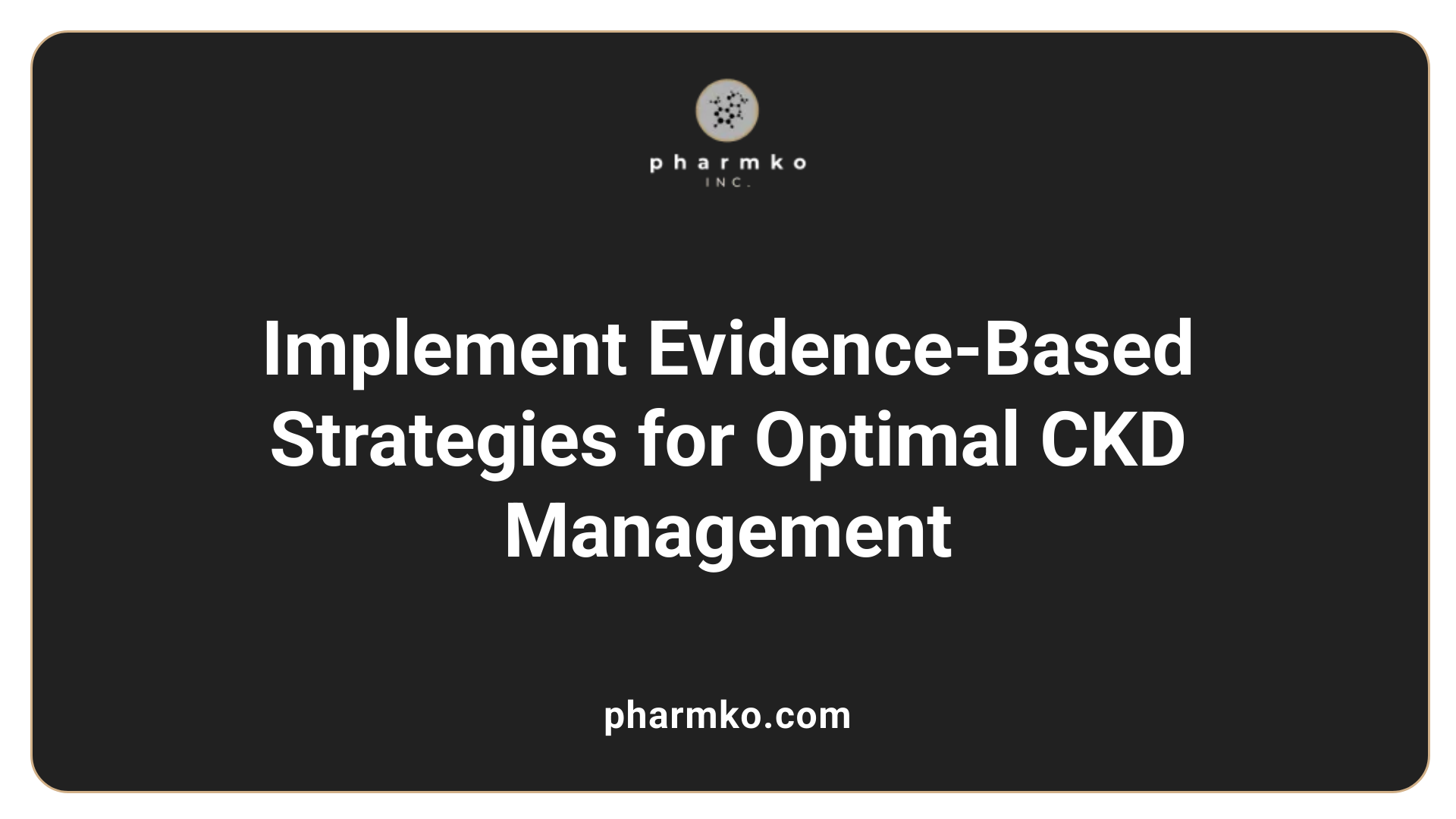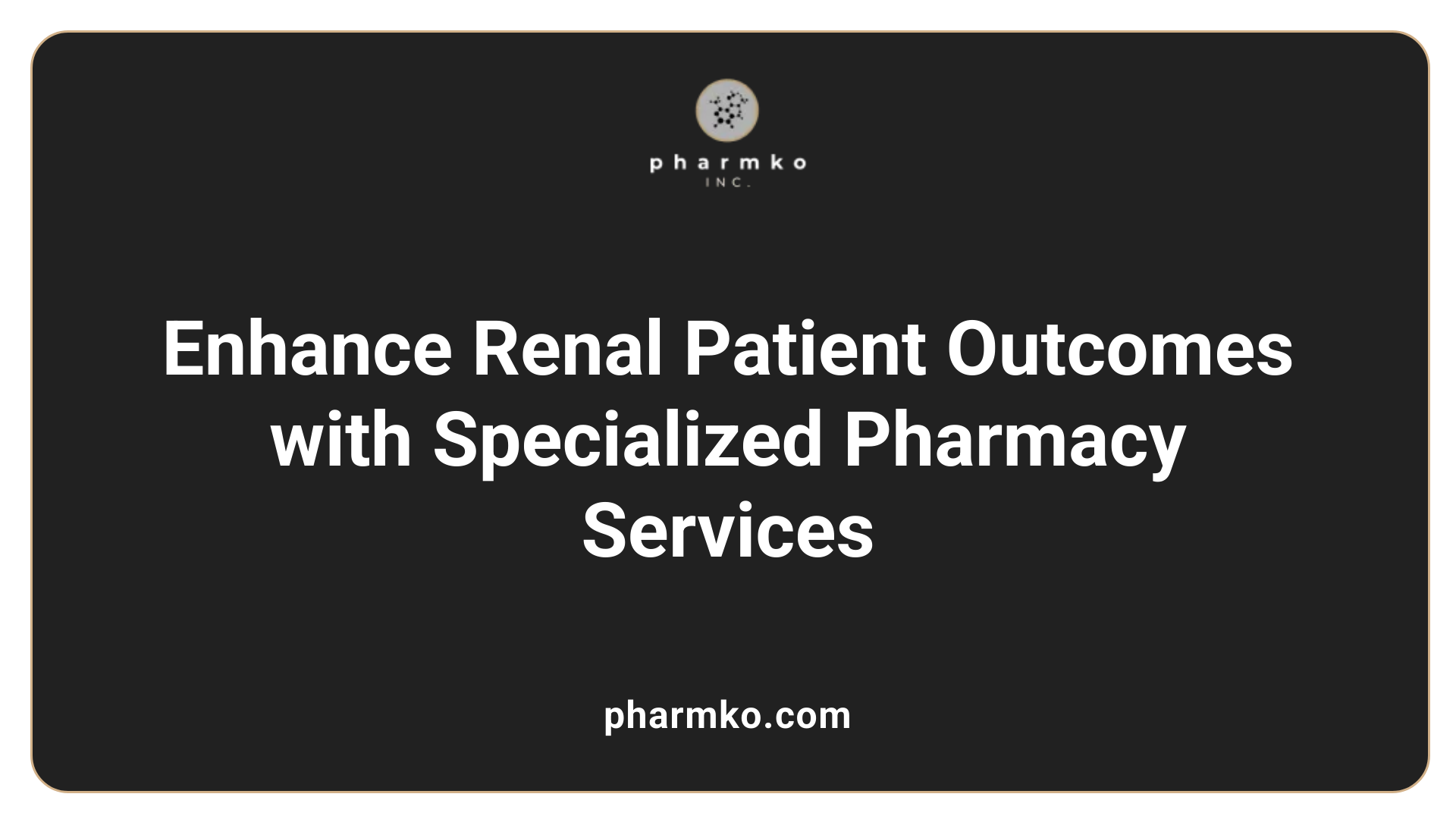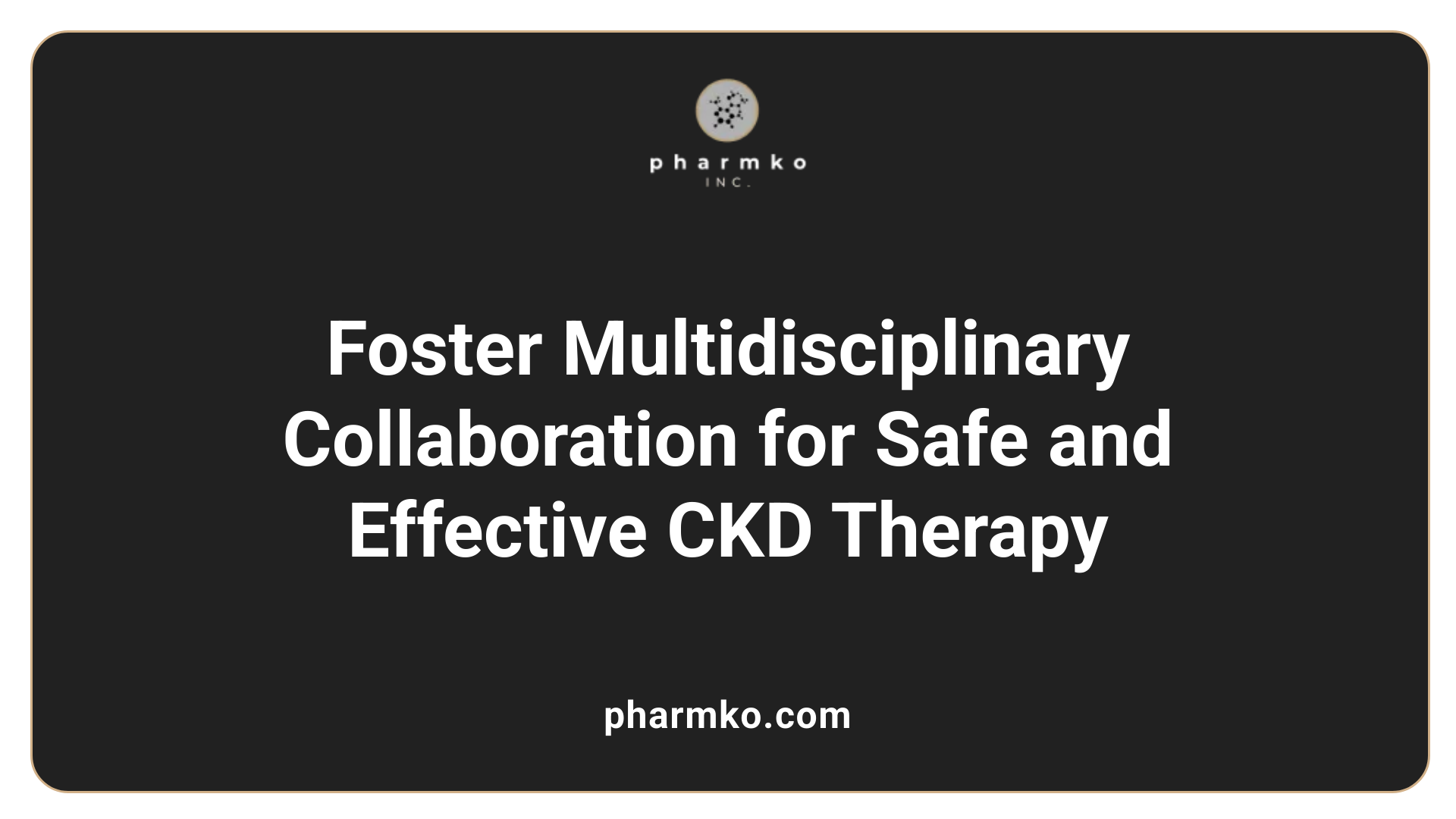Renal patient care with Pharmko
Transforming Renal Care Through Pharmacy Innovation
Renal patient care is an evolving discipline that requires a collaborative, evidence-based approach to improve outcomes, reduce complications, and enhance quality of life for those with chronic kidney disease (CKD). Pharmko stands at the forefront of this transformation, integrating clinical expertise, innovative resources, and a multidisciplinary approach to early detection, medication management, and patient education. This article explores the strategic role of Pharmko in advancing renal health, emphasizing best practices, pharmacist contributions, collaborative models, and educational standards that underpin optimal kidney care.
Principles and Best Practices in Renal Patient Care

How is early detection of CKD conducted with GFR and uACR tests?
Routine screening for chronic kidney disease (CKD) is vital for early identification and intervention. Tests like estimated Glomerular Filtration Rate (eGFR) and urine Albumin-to-Creatinine Ratio (uACR) are essential tools to detect declining kidney function and albuminuria, indicating early kidney damage.
Identifying high-risk patients—such as those with diabetes, hypertension, or cardiovascular disease—is a primary step. Regular testing helps in catching CKD before symptoms develop, allowing for timely management that can slow disease progression.
How are individualized treatment plans formulated based on evidence-based guidelines?
Care strategies should follow established protocols like the NKF KDOQI guidelines, which focus on personalized approaches considering each patient’s unique health status. Effective plans include controlling blood pressure, managing blood glucose, and reducing lipid levels to diminish the risk of cardiovascular events.
Medications such as ACE inhibitors or ARBs are often prioritized to protect kidney function. Lifestyle modifications, including diet and exercise, are core components of comprehensive management.
How is the monitoring of cardiovascular and mineral metabolism risk factors incorporated?
Chronic kidney disease significantly elevates risks of cardiovascular issues and mineral imbalances. As kidney function declines, patients are monitored for hyperphosphatemia, secondary hyperparathyroidism, anemia, and cardiovascular disease.
Regular assessments of blood pressure, serum mineral levels, and cardiac health are integral to adjusting treatments promptly. This proactive approach minimizes complications like bone disorders and heart disease.
How do interdisciplinary teams collaborate effectively?
Optimal CKD care involves a team-based approach with nephrologists, primary care clinicians, dietitians, pharmacists, and other specialists working cohesively. Pharmacists play a crucial role by managing medication therapy, reducing medication-related problems, and ensuring safe drug use, especially as renal function affects drug elimination.
Pharmacists also assist in medication reconciliation, adherence counseling, and patient education, improving outcomes and reducing hospitalizations.
How is planning for renal replacement therapy prioritized?
For patients with advanced CKD, early planning for dialysis or transplantation improves quality of life and survival chances. Education about treatment options enables shared decision-making. When therapy is declined or not suitable, conservative management focusing on symptom control and quality of life becomes the goal.
By integrating these strategies, healthcare providers can deliver comprehensive, patient-centered renal care that emphasizes early detection, risk mitigation, and coordinated treatment planning.
| Principle | Key Actions | Supporting Evidence |
|---|---|---|
| Early detection | Regular GFR and uACR testing | NKF KDOQI guidelines |
| Individualized treatment | Tailored medication and lifestyle plans | Evidence from clinical studies |
| Risk factor monitoring | Blood pressure, mineral levels, cardiovascular health | CKD management protocols |
| Interdisciplinary care | Collaboration among specialists and pharmacists | Improved patient outcomes |
| Renal replacement planning | Patient education and early preparation | Clinical best practices |
Understanding and applying these principles ensures holistic management of CKD, ultimately improving patient health and quality of life.
Pharmacists’ Role in Chronic Kidney Disease Management

What role do pharmacists play in managing chronic kidney disease (CKD)?
Pharmacists are becoming essential contributors to CKD care. They support early detection and help manage the disease by providing comprehensive medication management tailored to renal function.
One of their main roles is adjusting medication doses based on a patient’s kidney function. Since CKD impacts how drugs are eliminated, pharmacists monitor for nephrotoxic agents and modify therapy to reduce adverse effects.
They also play a crucial part in preventing medication-related problems (MRPs), which are common in CKD patients due to complex medication needs and declining kidney function. By closely reviewing medication regimens, pharmacists can identify potential issues such as drug interactions or inappropriate dosing.
Educationally, pharmacists inform patients about the importance of medication adherence and lifestyle modifications that support kidney health. Proper adherence can slow disease progression, control blood pressure, and reduce cardiovascular risks.
Collaboration with healthcare teams is fundamental. Pharmacists work alongside physicians, nurses, and other specialists to optimize treatment plans for conditions like hypertension and anemia, common complications of CKD.
In addition, pharmacists facilitate early CKD screening by encouraging testing such as estimated glomerular filtration rate (eGFR) and urine albumin-to-creatinine ratio (uACR). These tests are vital for early diagnosis and timely treatment initiation.
Resources including guidelines, calculators, and educational materials are available to support pharmacists in these roles. Such tools enable them to deliver patient-centered care effectively.
In summary, pharmacists are integral to early CKD detection, ongoing management, and reducing associated health risks. Their involvement enhances clinical outcomes, reduces healthcare costs, and improves quality of life for patients with CKD.
Pharmacy Services Supporting Renal Patient Care

What pharmacy services support renal patient management?
Pharmacists play a crucial role in managing patients with chronic kidney disease (CKD) by providing a range of specialized services. These include comprehensive medication reconciliation to ensure safe and appropriate use of all drugs a patient takes. Pharmacists offer personalized counseling to improve medication adherence, which is vital given that CKD patients often have complex medication regimens.
Adjusting medication doses based on kidney function is another core service, preventing toxicity and adverse effects, especially as kidney function declines. Renal pharmacists work closely with healthcare teams to optimize therapy, monitor drug interactions, and identify potential adverse drug reactions.
Moreover, they provide extensive education to patients about their medications, addressing health literacy, social barriers, and the importance of adherence. Pharmacists also assist with insurance navigation and medication access, helping patients obtain financial aid when necessary.
Beyond direct patient care, these professionals are involved in developing protocols, conducting medication reviews, and supporting health initiatives such as immunizations or chronic disease management programs.
Overall, pharmacy services tailored for renal patients improve treatment safety, slow disease progression, and promote equitable, effective healthcare outcomes.
Strategies and Collaborations in Medication Management for Kidney Disease

What strategies are recommended for medication management in patients with kidney disease?
Managing medications effectively in patients with CKD requires a multidisciplinary approach centered around the patient's renal function. Pharmacists play a crucial role in guiding dose adjustments by utilizing GFR estimation methods such as eGFR to ensure safe and effective therapy. This ongoing adjustment helps prevent drug toxicity and limits the progression of kidney damage.
Monitoring for nephrotoxic medications is also vital. Drugs like NSAIDs, certain antibiotics, and other agents that depend heavily on renal elimination should be carefully managed or avoided if possible. Pharmacists and healthcare providers work together to identify these risks and modify therapy accordingly.
Collaboration with healthcare providers is essential for deprescribing unnecessary or harmful medications. Regular reviews on the need for each drug can prevent polypharmacy issues, reduce potential adverse effects, and improve overall patient outcomes.
Patient adherence is a significant factor in successful CKD management. Educating patients about their medications, organizing dosing schedules, and discussing the importance of adherence can significantly impact disease progression and complication prevention.
Utilizing resources such as clinical guidelines, medication calculators, and educational programs helps optimize therapy. These tools support clinicians and pharmacists in making evidence-based decisions tailored to each patient’s kidney function.
Integrating these practices into combined care models strengthens the management of CKD. The proactive involvement of pharmacists enhances medication safety, reduces adverse drug events, and helps maintain the quality of life for individuals with kidney disease.
| Strategy | Focus Area | Impact | Additional Notes |
|---|---|---|---|
| Dose adjustments guided by GFR | Medication dosing | Prevents toxicity, slows disease progression | Uses eGFR to tailor prescriptions |
| Monitoring for nephrotoxic drugs | Safety | Reduced risk of drug-induced kidney damage | Includes NSAIDs, certain antibiotics |
| Collaboration for deprescribing | Polypharmacy | Minimizes unnecessary medication use | Regular medication reviews needed |
| Patient education & adherence | Compliance | Ensures proper medication use | Enhances understanding of therapy |
| Use of diagnosis & treatment tools | Optimization | Supports evidence-based decisions | Includes guidelines and calculators |
Expanding pharmacist engagement through education, collaboration, and resource utilization is crucial. Such a team-based approach leads to safer, more effective treatment pathways for CKD patients.
Harnessing Pharmacy Expertise for Better Kidney Outcomes
Pharmko exemplifies the integration of pharmacy expertise into the multifaceted realm of renal patient care. Through embracing evidence-based practices, fostering strong collaborations, leveraging innovative resources, and maintaining a patient-centered approach, Pharmko significantly enhances early detection, careful medication management, and comprehensive education. These efforts contribute to reducing medication-related problems, slowing disease progression, improving quality of life, and lowering healthcare costs. The ongoing development of training standards and clinical research further supports pharmacists’ expanding role in nephrology, ensuring that patients with CKD receive safe, effective, and holistic care. As pharmacy services evolve within modern healthcare models, Pharmko is poised to continue leading improvements in renal health management, ultimately transforming the landscape of kidney care.
References
- Pharmacists and Chronic Kidney Disease
- Partnering with a Renal Pharmacy - Fresenius Medical Care
- New models of chronic kidney disease care including pharmacists
- Education Standards for Pharmacists Providing Comprehensive ...
- Practice Spotlight: Pharmacist in a Chronic Kidney Disease Clinic
- Pharmacists and Chronic Kidney Disease
- The effect of pharmacist‐led interventions on the management and ...
- Managing Chronic Kidney Disease - U.S. Pharmacist
- The Role of Pharmacists in CKD Care Teams in - Kidney News Online













